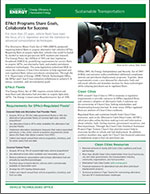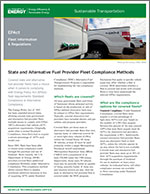About the Program
The State and Alternative Fuel Provider Fleet Program requires covered fleets to acquire alternative fuel vehicles (AFVs) as a percentage of their annual light-duty vehicle acquisitions or to employ other petroleum-reduction methods in lieu of acquiring AFVs. The U.S. Department of Energy (DOE) established these requirements through 10 CFR Part 490, available from the U.S. Government Printing Office.
Fleets covered by the State and Alternative Fuel Provider Fleet Program must meet their Energy Policy Act (EPAct) requirement to reduce petroleum consumption through one of two methods: Standard Compliance or Alternative Compliance. Learn more about compliance methods.
EPAct Regulatory Activities
EPAct 1992—as amended by other key federal statutes—directed DOE to regulate and guide State and Alternative Fuel Provider Fleets and Federal Fleets. DOE also created Clean Cities and Communities to provide informational, technical, and financial resources to EPAct-regulated fleets and voluntary adopters of alternative fuels and vehicles.
Find information about the State and Alternative Fuel Provider Fleet Program's transportation regulatory activities.
Alternative Fuel Petitions
EPAct authorizes DOE to add fuels to the list of EPAct-defined alternative fuels by making a final rule after a petition process. Petitioners must demonstrate fuel composition, environmental, and energy security benefits before DOE will undertake a rulemaking. Learn more about the regulatory process for alternative fuel petitions.
Annual Reports
The State and Alternative Fuel Provider Fleet Program compiles annual reports that show how covered fleets meet their EPAct 1992 annual requirements for each model year.
Fact Sheets
Learn about EPAct transportation regulatory activities through these fact sheets.
Contacts
Contact the State and Alternative Fuel Provider Fleet Program with questions or comments about this program or other EPAct transportation regulatory activities.


